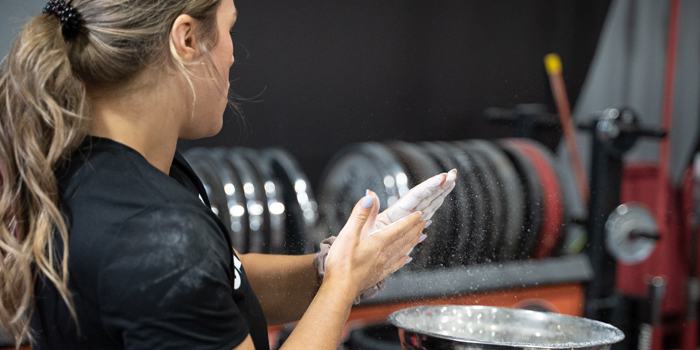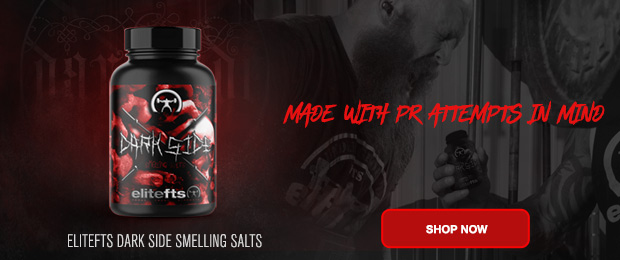
Let's cut right to the chase. Suppose you have PCOS (polycystic ovarian syndrome). In that case, you should not eat any dairy, gluten, processed foods, sugar, anything with dyes, artificial sweeteners, foods that are round in shape, water, anything out of a box, or at Walmart, or any grocery store except Whole Foods, but only the organic stuff, oh and no meat, and...
Sound familiar? This is what it's like for any woman with PCOS trying to figure out how to optimize her nutrition. It's a complete shit show. A quick Google search will essentially fill your screen with a million "don't eat this" statements that, quite frankly, are total bullshit.
RELATED: The Top-4 Habits of Successful Dieters
I will cut right to the chase again. There is no "best diet" or protocol of any kind for PCOS. Before you stop reading, I will give y'all food, lifestyle, and supplement suggestions that can absolutely help those with PCOS.
Let's first be clear on some things.
There is no "best diet" for PCOS because PCOS is a broad-brush term to describe a woman's symptoms, similar to IBS (irritable bowel syndrome). No two women diagnosed with PCOS are the same, nor experience the same symptoms 100 percent of the time. Before we can dive into what you should eat or not eat if you have PCOS, we first need to identify the different types of PCOS. YES. There are different types. First let's define what PCOS is in the first place and how women can develop this condition.
What is PCOS?
PCOS is a hormonal disorder that causes irregular menstrual cycles and symptoms such as heavy periods or no periods, acne, extreme PMS, ovarian cysts, hair growth on the body, hair loss on the scalp, etc. It is caused by an imbalance of hormones and usually high levels of androgens such as testosterone and DHT (Dihydrotestosterone.) But what CAUSES these hormones to be imbalanced in the first place? Great question. Research is still inconclusive on this one. No one really knows. Many point to environmental toxins, some say stress and/or lifestyle/poor diet, others say genetics, etc. The list goes on. Hell, it could be a mix of all of those things. The CAUSE may be better understood if we can identify the TYPE first.
4 Types of PCOS
Insulin Resistant PCOS
This is largely the most common form of PCOS we see. Around 70 percent of women with PCOS have insulin resistance (high insulin levels.) Diet is very important for every woman with PCOS but even more so here. Insulin-resistant PCOS occurs when insulin runs higher than it should because the cells are not responding normally, leading to more and more insulin being pumped out. This can indirectly lead to higher androgen levels as well. Women with insulin-resistant PCOS usually have a harder time losing weight due to this.
What Should You Do If You Have Insulin-Resistant PCOS?
The main thing to focus on here is diet. HOWEVER, that does not mean eliminating everything. Nine times out of 10, when we have a client come to us with PCOS, their diet is pretty unhealthy as it is. Simply improving food sources will go a long way. Even starting with the 80/20 rule can be super helpful here.
A few simple tips to follow:
- Make sure every meal is centered around a high-quality protein source. Eating adequate protein intake can help manage blood sugar and keep you satiated.
- Get at least 25g of fiber in daily bare minimum.
- STRENGTH TRAIN. This will improve insulin sensitivity.
- Go for lower glycemic carb sources mostly, keep high GI carbs sources around training.
- Some supplements that can help bring down blood sugar and improve insulin sensitivity are berberine, inositol, and bitter melon.
Adrenal PCOS
Adrenal PCOS occurs due to an irregular stress response in the body. This is where we might see really high or really low morning cortisol levels or high DHEA-S, along with symptoms along the lines of chronic fatigue, insomnia, hypothyroidism or sluggish thyroid, etc.
What Should You Do If You Have Adrenal PCOS?
The main focus here needs to be overall stress management. Of course nutrition and exercise matters, and those need to be dialed in, but bringing stress down in this situation is a necessity. Your diet can be on point, but you will still have symptoms if stress is not being addressed.
A few simple tips to follow:
- Get enough sleep. This goes without saying, but six hours a night ain’t enough home girl. Eight-plus hours of quality sleep is necessary. Also if you are interested in tracking your sleep to ensure you are getting enough, I recommend getting something like an Oura Ring.
- Practice self-regulation. Perceived stress needs to be controlled, and that comes with learning how to control your emotions and how you react to bad situations. BREATHE.
- Set boundaries. Saying yes to everything and overwhelming yourself on a daily basis is not serving you. Know your limits, set them, and stop running around like a chicken with your head cut off.
- Limit caffeine intake.
- Take a chill pill on workouts. Limit HIIT and stick to moderate-low intensity training.
- Some supplements that can help are adaptogens such as ashwagandha. But also rhodiola, phosphatidylserine, and minerals and vitamins such as magnesium and Vitamin B5.
Post Birth Control PCOS
Luckily (for the most part), this type is temporary for most women. When women come off hormonal birth control, they can experience an increase in hormone fluctuations at first (some call this hormone rebound), typically the first three to six months post. The symptoms they experience can be things like heavy or inconsistent periods, no period at all, acne, ovarian cysts, hair loss, fatigue, extreme PMS, etc. Usually, this resolves itself on its own, however, if the pill was used to "treat" period symptoms in the first place, there could have been underlying PCOS all along that was never addressed. Therefore the symptoms will not resolve themselves on their own.
What Should You Do If You Have Post Birth Control PCOS?
Be patient and show grace to yourself first and foremost. There is a good likelihood that your hormones will balance out in three to six months. Start tracking your symptoms and cycle in something like the FLO app. This app is super helpful to determine regularity and ovulation. If your cycle is still inconsistent and/or symptoms do not improve after three to six+ months, get blood work done to see what is going on. Test don't guess.
A few simple tips to follow:
- Like I mentioned up top, start tracking your cycle. This will also give you valuable information to show to a doctor if needed.
- Be patient. Post birth control sucks. But stay the course. Many women jump back on birth control after a month because they get freaked out by the hormone fluctuations. (Which, I don’t blame them.) But...it gets better, or at least it should. Be patient.
- Go back to the tips from Insulin Resistant PCOS. Diet matters here and if you eat like shit you will feel like it and it will influence your cycle trying to regulate and find homeostasis.
- Some supplements that can help are a methylated B-Vitamin Complex (B vitamins get depleted while taking hormonal birth control, especially the pill), saw palmetto to fight against hair loss from the hormone rebound, and chasteberry for progesterone support (*chasteberry is not advised for the other types of PCOS).
Inflammatory PCOS
Inflammatory PCOS is probably the least common type that I see, but it occurs due to excess inflammation in the body, causing an increase in androgens or gut issues. This is where we might see a woman diagnosed with PCOS and IBS or another inflammatory condition simultaneously. We can see high CRP (C-reactive protein) here as well.
What Should You Do If You Have Inflammatory PCOS?
Make sure you are working with a practitioner to uncover where the inflammation is coming from. How to go about managing inflammatory PCOS has to start with where the inflammation is originating (which is usually the gut) but you could also have an undiagnosed autoimmune condition that is also causing the inflammation. It's super important to dig deeper here!
A few simple tips to follow:
- Focus on your gut health. Everything starts with the gut. Keep processed foods to a minimum to reduce inflammation, but complete restriction is not necessary.
- Eat fermented veggies for gut bacteria support.
- Do not eat foods that give you symptoms. For example if dairy destroys your stomach, limit it. This may not be a forever thing, but if you are constantly putting foods into your body that are causing more and more inflammation you will turn into a hamster in a wheel.
- Pay attention to your environment. Limit use of paraben ridden makeups/products or candles, BPA plastics, soy-based foods, aluminum-based deodorants, etc.
- Some supplements that can help are omega 3 fatty acids, turmeric, and citrus bergamot for inflammation, L-glutamine to support the gut microbiome, and NAC (N-acetyl cysteine) for liver support.
Some Great Food Sources for Any Type of PCOS
- Any food high in omega 3’s such as salmon, other cold water fish, and grass fed/pasture-raised meats
- High fiber fruits (like raspberries)
- Cruciferous veggies (like broccoli)
- Seeds and nuts
- Fermented veggies
- Healthy fats such as avocados and coconut oil
Many of you may be asking yourself, "What type do I have?" because you were probably never told. In order to identify which type you have, I would get a full hormone panel done to see what levels are off and where the symptoms are coming from. Now, if you are being treated with medications such as metformin or were put on birth control to suppress hormone function, you won't be able to see it fully. So have a conversation with your doctor to clarify the best course of action for YOUR type. If your doctor never identified the type you have, find a new doctor.
To finish this off, I will say it again, there is no "best" diet or food for PCOS. To say there is, oversimplifies the condition and is misguided. No, you do not have to remove carbs. No, you do not have to go gluten- or dairy-free (UNLESS those specific foods negatively impact digestion,) and no, you do not have to restrict everything you love. More likely than not, you simply need to make a few small tweaks to your diet, workouts, and lifestyle. And I have had plenty of clients with PCOS who live 100 percent symptom-free! They put in the work and time to make their health a priority. It can be done, and remember, PCOS is not a death sentence. It is simply a part of you that can be managed.
Alycia Israel is a nationally qualified NPC figure and bikini competitor and raw powerlifter. She has a master’s degree in exercise physiology, is an NSCA-certified strength and conditioning specialist, and an ISSN-certified sports nutritionist. As the former personal training coordinator at Ohio State University for seven years, she currently owns and operates Alycia's Barbell, an online training and nutrition business that helps clients lose fat for life or jump on the competitive bodybuilding stage. She can be contacted at alyciafit@gmail.com.










